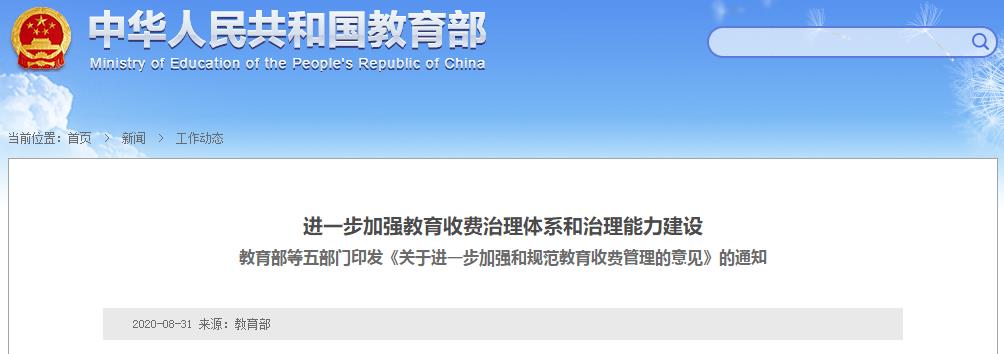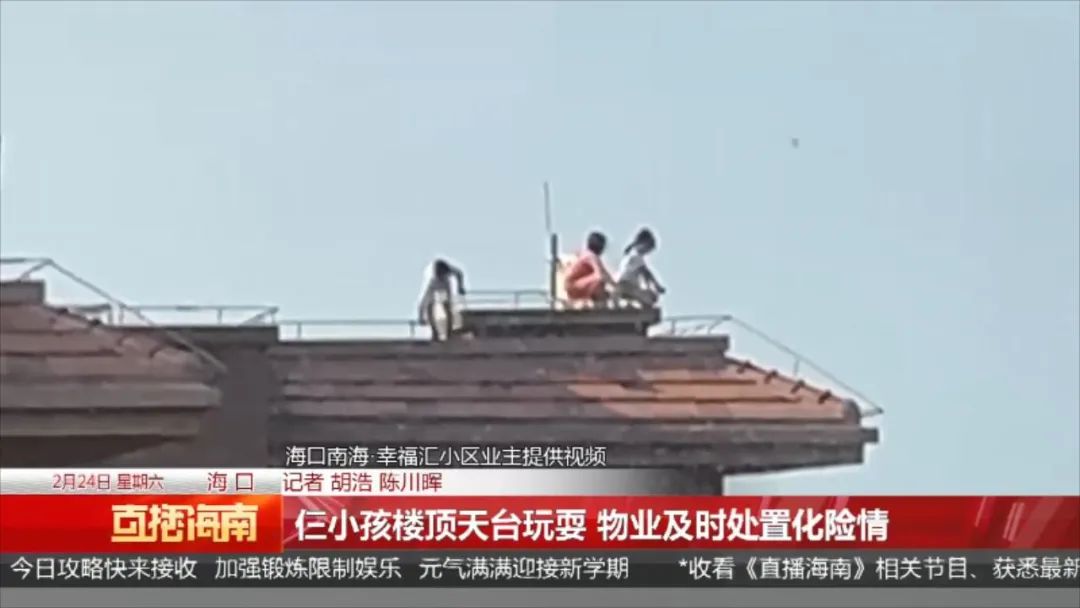央视网消息:据教育部网站信息,日前,教育部等五部门印发《关于进一步加强和规范教育收费管理意见》的通知(简称《通知》),要求各地按照规定的管理权限全面落实教育收费管理主体责任,正确处理好政府与社会、受教育者的关系,正确处理好教育收费与财政拨款、学生资助的关系,正确处理好简政放权和放管结合、优化服务的关系,进一步完善教育收费政策体系、制度体系、监管体系,提升教育收费治理能力。

关于进一步加强和规范教育收费管理的意见
党中央、国务院历来高度重视教育收费管理工作,自全国治理教育乱收费部际联席会议制度建立以来,在各有关部门、地方各级政府的共同努力下,教育收费水平保持了基本稳定,教育乱收费现象得到了有效遏制。但随着经济社会的发展,教育收费管理工作在体制机制、政策执行、监督管理等方面仍然存在一些问题,与教育改革发展的需要和人民群众的期待仍然存在一定差距。为贯彻落实《中国教育现代化2035》《国务院办公厅关于进一步调整优化结构 提高教育经费使用效益的意见》等文件精神,进一步加强和规范教育收费管理,现提出以下意见。
一、总体要求
(一)指导思想
以习近平新时代中国特色社会主义思想为指导,全面贯彻落实党的十九大和十九届二中、三中、四中全会精神,深入贯彻落实全国教育大会精神,始终坚持把教育事业摆在优先位置,主动适应教育、财税、价格等领域改革新要求,巩固完善以政府投入为主、多渠道筹集教育经费体制,逐步完善各级各类教育投入机制和非义务教育培养成本分担机制,建立健全教育收费政策体系、制度体系、监管体系,提升教育收费治理能力,持续巩固教育乱收费治理成果,促进教育公平而有质量的发展。
(二)基本原则
——坚持公益属性、分类管理。坚持教育的公益性,充分发挥政府对教育事业的主导作用。区分义务教育和非义务教育的不同阶段,区分非营利性和营利性民办教育的不同属性,正确处理政府与社会、受教育者之间的关系,合理分担教育培养成本。
——坚持分级审批、属地管理。教育领域行政事业性收费项目、标准实行中央和省两级审批,中央部门所属学校收费标准实行属地管理。各省、自治区、直辖市(以下简称各省)按照规定的管理权限,科学制定收费政策,加强收费项目管理,合理确定收费标准,全面落实教育收费管理主体责任。
— — Adhere to problem orientation, reform and innovation. Constantly improve the management system of education fees, improve the policy of education fees, strengthen the management of fees in key areas and key units, focus on solving the problems of fees system and mechanism that are incompatible with the reform and development of education, and focus on solving the problems of fees that are strongly reflected by the masses. Administer education in an all-round way according to law, adhere to administration and financial management according to law, strengthen supervision after the event, combine daily supervision with special supervision, and innovate the way of charging supervision.
Second, improve the education charging policy
(3) Adhere to the nine-year compulsory education system. Compulsory education is fully included in the scope of financial security, and public compulsory education schools do not charge tuition and miscellaneous fees. All localities should strictly implement the compulsory education law, consolidate and improve the funding guarantee mechanism for compulsory education in urban and rural areas, adhere to the nine-year compulsory education system, and prohibit arbitrarily expanding the implementation scope of the free education policy. The standard of exempting students from tuition and miscellaneous fees in private compulsory education schools is implemented according to the benchmark quota of public funds per student; For the part with insufficient per capita education and training cost, we should strictly implement the non-profit statutory requirements and reasonably determine the charging standard. It is strictly forbidden to collect donations linked to enrollment. In accordance with the relevant provisions of the state, schools or other social organizations that recruit students in the compulsory education stage to carry out professional training in literature, art and sports should not include tuition and fees that students are exempted from after completing the nine-year compulsory education course.
(four) adhere to the implementation of non compulsory education training cost sharing mechanism. Non-compulsory education implements the input mechanism of government investment, reasonable sharing by the educated and financing from other channels. According to the cost of running a school, the level of economic development and the financial situation, all provinces should implement and dynamically adjust the per capita financial allocation standard or the per capita public funding standard for public kindergartens, ordinary high schools, secondary vocational schools, higher vocational colleges and ordinary undergraduate colleges. Schools (including kindergartens, the same below) charge tuition fees (conservation education fees) to the educated according to a certain proportion of the annual average cost of education and training, and charge accommodation fees to boarding students in consideration of actual costs (excluding financial allocations). Students with financial difficulties in families enjoy the policy of reduction and exemption in accordance with relevant state regulations. All provinces should reasonably determine the proportion of tuition fees (conservation education fees) of public kindergartens, ordinary high schools and secondary vocational schools to the annual average education and training costs in light of local conditions. At present, the proportion of tuition fees in public institutions of higher learning to the annual average cost of education and training should not exceed 25%, and all localities should reasonably determine it according to the level of economic and social development, training costs and people’s affordability.
Kindergartens run by the army that recruit children of local personnel and enjoy subsidies from the local people’s government shall be charged in accordance with the relevant provisions of public kindergartens; Those who do not enjoy subsidies shall be specifically formulated by the army in accordance with relevant state policies, and the charging standards shall be reasonably determined. The charging policies for Chinese-foreign cooperative education and part-time postgraduate education shall be formulated by the provinces.
(5) Adhere to the classified management of private education fees. According to the relevant provisions of the Law on the Promotion of Private Education, the specific measures for charging non-profit private schools shall be formulated by the provincial people’s government; The charging standards of for-profit private schools shall be regulated by the market and decided by the schools themselves. The charging standard of inclusive private kindergartens is determined reasonably according to the administrative measures for the identification of inclusive private kindergartens promulgated by provincial people’s governments, taking into account the charging levels of public kindergartens and inclusive private kindergartens as a whole, and taking into account factors such as the level of economic development, the affordability of the masses, the cost of running parks and the level of financial subsidies. All localities should speed up the formulation and implementation of financial subsidy standards for inclusive private kindergartens, implement public subsidies for private schools in the compulsory education stage, strengthen the regulation of charging standards, and resolutely prevent excessive fees. Private schools established before November 7, 2016 shall be managed as non-profit private schools before completing the relevant procedures for classified registration.
(six) improve the school service charges and fees and other policies. In addition to completing the normal tasks of conservation, education and teaching, the school provides students with relevant convenient services needed for study and life, and organizes activities such as study tours, after-school services and social practice. For the part borne by students or their parents, service fees can be charged according to the principles of voluntariness and non-profit. If the relevant services are provided by institutions or individuals outside the school, the school may collect and pay the relevant fees. The specific policies on school service charges and agency charges shall be formulated by the provinces. Projects that have been explicitly prohibited by the state or explicitly stipulated by the financial guarantee shall not be included in service charges and fees on behalf of the school. Schools shall not set up service charges and fees on behalf of the school without authorization, and shall not obtain the difference in the fees collected. They shall not force or imply students and parents to buy designated teaching AIDS or materials, and shall not charge related fees by starting classes in advance or in disguised form. In-school student dormitories and off-campus student apartments organized by social forces are not allowed to provide relevant life services or bundle service charges with accommodation fees. The school’s self-operated canteen shall collect meals from students who voluntarily dine, and shall adhere to the principle of public welfare and shall not be for profit.
(7) Improve the charging policy for overseas Chinese students from Hong Kong, Macao and Taiwan studying in the mainland (the mainland of the motherland). For students from Hong Kong, Macao and Taiwan who study in the mainland (the mainland of China) and overseas Chinese students who study in primary and secondary schools and kindergartens, the same charging policy as that for mainland students (the mainland of China) shall be implemented in accordance with relevant regulations; Admission to the mainland (the mainland) ordinary colleges and universities and research institutes, in accordance with the relevant provisions of the implementation of the same fees as the mainland (the mainland) students.
(eight) improve the international student fee policy. For international students studying in public primary and secondary schools and kindergartens, the charging policies shall be formulated by the provinces. The school charging policy for children of foreigners shall be formulated by the school independently. The charging standard for self-funded international students in China accepted by colleges and universities is reasonably determined by the school according to the local economic and social development level and training cost, so as to avoid vicious competition. According to the agreement between the Chinese government and the sending country, the charging policy for students who come to China for education shall be implemented in accordance with relevant regulations.
Third, improve the management system of education fees
(nine) to establish and improve the dynamic adjustment mechanism of education fees. All localities should, in accordance with the prescribed management authority and the principle of territorial management, comprehensively consider factors such as the level of economic and social development, the cost of education and training, and the affordability of the masses, reasonably determine the charging standards for tuition fees (conservation and education fees) and accommodation fees of public schools, and establish a dynamic adjustment mechanism for charging standards that is compatible with the level of funding and funding. If there is any change in the school charging policy, it should be publicized to the public before the release of the enrollment brochure. Encourage all localities to adapt to the teaching organization mode under the flexible academic system and explore the implementation of credit system charge management in colleges and universities. In schools that have been approved to implement credit system fees, the total tuition fees paid by students who normally complete their studies according to the credit system training program shall not be higher than the total tuition fees for the implementation of the academic year system in principle, and other professional courses are added or re-courses are re-taken. Schools can charge fees according to the credit charging standards stipulated in the courses. Tuition and accommodation fees shall be charged according to the academic year or semester, and shall not be collected in advance across academic years (semesters). If students drop out of school, drop out of school, finish their studies early or transfer with approval, the school should reasonably determine the amount of refund according to the actual study time. All localities should fully implement the state’s various financial aid policies, help students with financial difficulties to solve practical problems, and must not affect their normal study and life because of the adjustment of tuition standards.
(ten) to strengthen the education and training cost investigation. Timely revise and improve the Measures for the Supervision and Examination of Education and Training Costs in Colleges and Universities (Trial), and organize the supervision and examination of the annual average education and training costs in colleges and universities. In accordance with the pricing authority, according to the Price Law, the Measures for the Supervision and Examination of Price Costs Formulated by the Government, etc., combined with local conditions, all provinces actively carry out the investigation of education and training costs in kindergartens, ordinary high schools and secondary vocational schools, and standardize the investigation behavior of education and training costs. Schools at all levels and of all types should strengthen cost accounting, and record and account the education and training costs completely and accurately.
(eleven) standardize the hearing system of education fee decision. All localities should formulate or adjust tuition fees and other charging standards of various schools at all levels organized by the government in strict accordance with the authority and procedures prescribed by the state, include them in the catalogue of pricing hearings and conduct hearings, fully solicit opinions from relevant sectors of society, and ensure the democratic, scientific and transparent decision-making on education fees. If the standard of education fees is lowered, or the adjustment of the standard of education fees involves a small area, the hearing may adopt a summary procedure. To formulate other educational charging standards, and if necessary, a hearing can also be held.
(twelve) strictly implement the publicity system of education fees. All localities should strictly implement the publicity system of education fees, and no fees shall be charged without publicity. All kinds of schools at all levels should establish and improve the standardized dynamic management system of charge publicity and take the initiative to accept social supervision. The charging items and standards should be publicized to students in a prominent position in the school, and indicated in the enrollment brochure and the admission notice. In the compulsory education stage, the charging standard of private schools should be publicized together with the subsidy of public funds per student obtained by schools. Students have the right to refuse to pay fees that should be publicized but not publicized according to the regulations, or fees that are inconsistent with the prescribed policies. When the charging policy changes, the school should update the publicity content in time to ensure that the publicity content is legal and effective. All localities should strictly implement the list of administrative fees such as education fees, and shall not increase the fees and expand the scope of fees without authorization.
(thirteen) to strengthen the management of education fees. Tuition and accommodation fees of public ordinary high schools and secondary vocational schools, tuition fees, accommodation fees, entrusted training fees of public institutions of higher learning, night and short-term training fees of Handu Radio and TV University, etc., as business income, are included in the financial special account management according to the requirements of "two lines of revenue and expenditure". Public kindergarten fee income management according to the existing regulations. Service fee income shall be charged by the school according to the regulations; On behalf of the school fee income all transferred to provide services units, shall not be included in the school income. Schools should incorporate all the income and expenditure of education fees into departmental budget management and increase the overall planning of funds; The expenses related to the arrangement of education fees shall be included in the standardized management of the project library according to the regulations. Combined with other income such as education fees, we will make overall arrangements for the budget of financial allocation to give better play to the efficiency of the use of financial funds. All localities shall not use the school fee income to balance the budget, and shall not occupy, intercept, transfer or misappropriate the school fee funds in any form. Private school fee income should be paid into the school bank account filed by the education administrative department for unified management, which is mainly used for education and teaching activities, improving school conditions and ensuring the treatment of faculty and staff, and drawing development funds according to relevant laws and regulations. When collecting administrative fees, schools should use the financial bills printed (supervised) by the financial department in accordance with the financial affiliation, use the corresponding tax invoices when collecting service fees, and use the fund settlement bills when collecting fees.
Fourth, strengthen the governance of education fees
(fourteen) the implementation of education fees supervision responsibility. Education fees adhere to the principle of "who approves and who is responsible". The member units of the joint conference on the control of arbitrary charges in education shall, according to their respective responsibilities, incorporate education charges into the catalogue management, adjust them dynamically in a timely manner and announce them to the public in a timely manner, and supervise the implementation of relevant charging items and charging standards according to law; Strengthen the cost investigation of education fees, and establish and improve the dynamic adjustment mechanism of fees; Strengthen the supervision and inspection of fees in the field of education, and investigate and deal with illegal fees according to law; Strengthen the price management of teaching materials and supplementary materials; Guide schools at all levels to implement the education charging policy and standardize the charging behavior. All kinds of schools at all levels should strictly implement the prescribed charging scope, charging items, charging standards and charging methods, and establish and improve the school charging management system.
(fifteen) improve the management mechanism of education fees. All localities should attach great importance to the management of education fees, establish and improve the leadership system and working mechanism, and persist in systematically promoting the management of education fees. The member units of the joint meeting of the local governments to control unreasonable charges in education should make overall coordination, improve the mechanism of regular consultation and information release, form a work pattern of charge management with clear responsibilities, collaborative linkage and mutual promotion, and strengthen the governance of education charges in key areas. It is necessary to bring the management of education fees into the scope of education supervision. Explore the establishment of a special audit system for school fees, focus on strengthening the audit of non-profit private schools, and prohibit the organizers of non-profit private schools and non-profit Chinese-foreign cooperatively-run schools from obtaining income from school-running income such as tuition fees, distributing school-running balance (surplus property) or transferring school-running income through related transactions and related parties in various ways.
(sixteen) to increase the investigation and punishment of illegal charges. All localities should strengthen the daily supervision and regular inspection of education fees, establish and improve the risk early warning of education fees, acceptance of letters and visits, supervision and supervision, public notification and interview mechanisms, and seriously deal with the problems of illegal fees found. Establish and improve the accountability mechanism, the main responsibility of charge management is not implemented, measures are not in place, damage the vital interests of the masses, resulting in adverse social impact of the units and related responsible persons should be seriously accountable. If the illegal charges of private schools have a bad influence, the enrollment plan and financial support funds will be deducted according to the law until the school license is revoked or revoked.
(seventeen) to strengthen the basic capacity building of education fee management. Implement the "National Education System Financial Management Cadre Training Implementation Plan", organize and carry out education fee management training, and improve the ability and level of education fee management. All localities should make full use of modern information technology, explore the establishment of an annual statistical reporting system for education fees, strengthen the management of education fees, further strengthen service awareness, and improve service capacity and level.
The management of educational fees in scientific research institutes and party schools at all levels shall be implemented with reference to this opinion, and the policies for the management of fees in institutions affiliated to education departments at all levels shall be formulated separately.


















